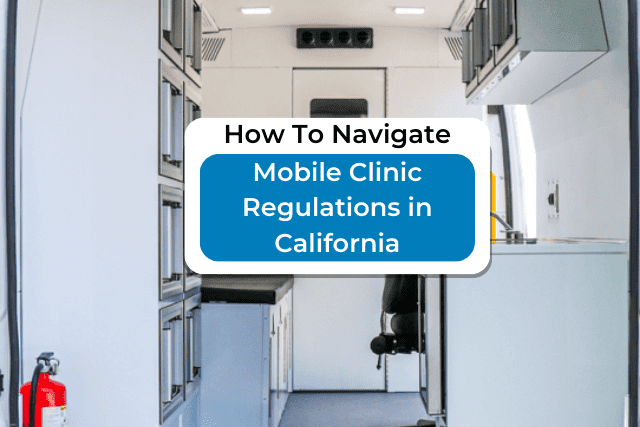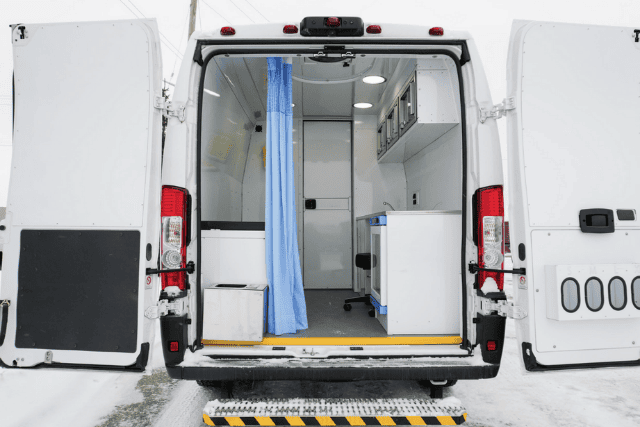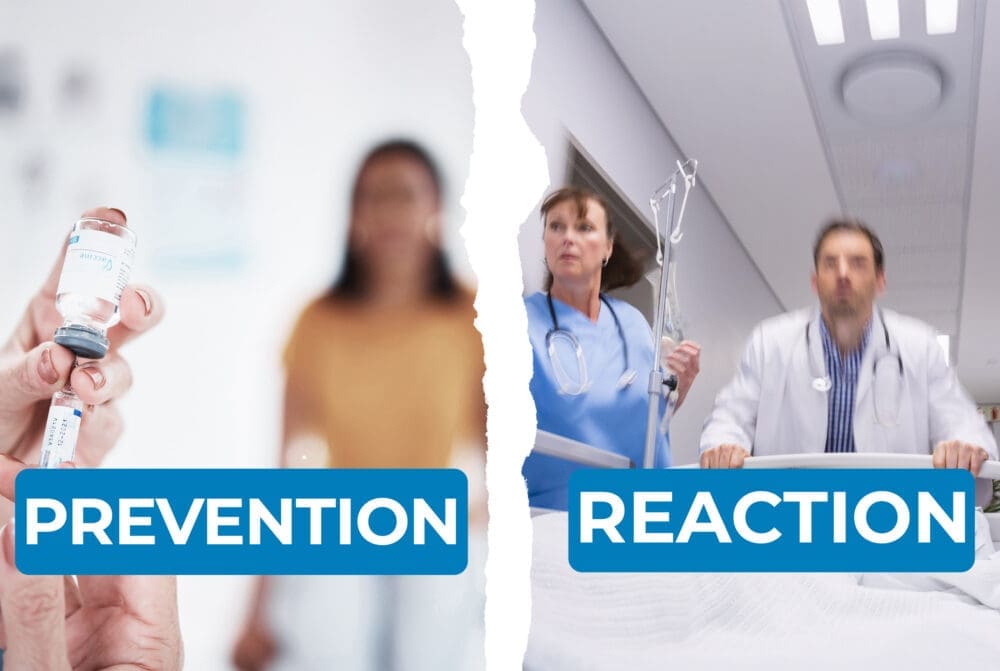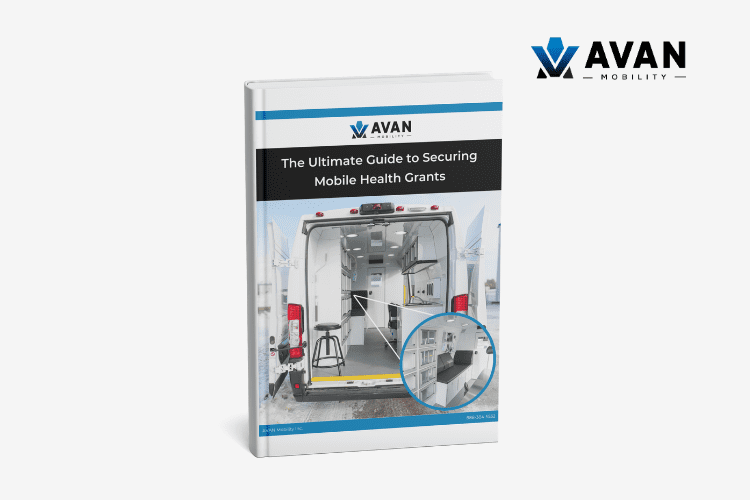Are you confused about mobile clinic regulations in California? You’re not alone. Many organizations like yours want to use mobile health clinics to bring healthcare right to people who need it, but California’s regulations can feel somewhat like a maze. You might even be wondering if it’s all worth the effort.
The regulations around licensing can seem overwhelming. Not getting this right could lead to costly delays or even missed chances to help the people counting on your mobile healthcare. But don’t worry—this guide will answer your questions and make things clearer.
At AVAN Mobility, we understand your struggle. We’ve spent over 10 years helping organizations like CalOptima and yours break down barriers to healthcare with our mobile clinics. We focus on manufacturing vehicles to make healthcare more accessible and save lives.
What you’ll learn here: This guide will help you understand and follow the mobile clinic regulations in California in a way that’s easy to understand. We’ll cover licensing needs, break down the Mobile Health Care Service Act (MHCSA), and more. You’ll learn what’s needed so you can focus on what matters most: helping others.
What is a mobile clinic in California?
A mobile clinic is a traveling healthcare facility that provides medical, dental, or therapy services to patients for less than 24 hours. It can also offer home care services connected to treatments given at the clinic. These clinics are designed to bring care directly to people, whether it’s in urban neighborhoods or remote areas.
What doesn’t count as a clinic?
Not every place that offers health-related help is considered a clinic. Here’s what doesn’t need to follow traditional mobile clinic regulations:
Advice-only services: Places that only provide counseling, referrals, or health tips without practicing medicine or surgery.
Non-medical facilities: Sites that don’t offer hands-on care, like psychological or wellness advice centers, are not classified as clinics under state rules.
What counts as a mobile clinic?
Primary care clinics: These include community clinics and free clinics.
- Community clinics: Operated by nonprofits with support from donations, grants, or government funding. Charges depend on a patient’s ability to pay.
- Free clinics: Provide services at no charge to patients, relying entirely on voluntary funding.
Specialty clinics: Include surgical, dialysis, rehabilitation, and birth clinics. They offer specialized care (like outpatient surgery or physical therapy).
Mobile clinics: Mobile healthcare units, like the ones governed under the Mobile Health Care Service Act, also count as clinics when they provide primary care services. These units need proper licensing to operate.
Check out the licensing provisions for a more elaborated version of this information.
What if I’m adding a mobile clinic to an existing primary care clinic?
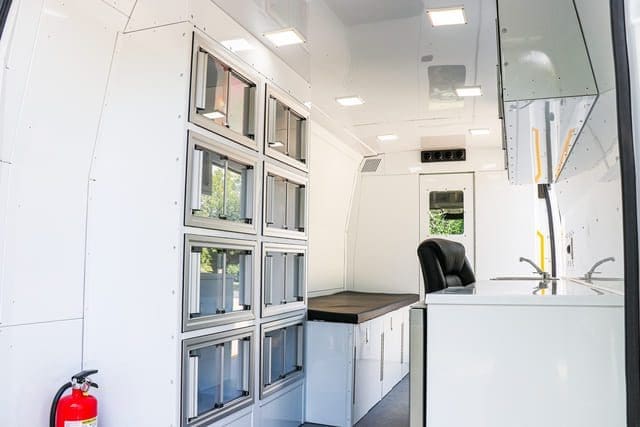
If you already have a licensed Primary Care Clinic (PCC) and you’re looking to add a mobile unit, there are a few options based on mobile clinic regulations in California. Below, we’ll walk you through the three main ways to integrate a mobile clinic with your existing services.
Affiliate mobile clinic
An affiliate mobile clinic allows a licensed PCC to set up a mobile health care unit, but only if the clinic meets specific criteria:
Clinic’s history:
- The PCC must have held a valid mobile clinic license for at least five years.
- It should not have any unresolved or repeated violations that put patient safety at risk.
- There must be no ongoing actions to revoke or suspend the license.
Operational requirements:
- The same corporate officers and nonprofit organizations must run the mobile clinic and the original PCC.
- Both facilities must share the same board of directors, medical director(s), and health care policies.
Fill out the application package for an affiliate mobile clinic.
Consolidated mobile clinic
With a consolidated license, your PCC can add other facilities—including mobile units—within half a mile of the main clinic. These extra locations are considered part of the same mobile clinic licensing.
Here are the key criteria to meet for a consolidated license:
- Single governing body: All locations must have the same leadership and board.
- Unified administration: The same team manages all sites.
- Medical leadership: All facilities share the same medical director, bylaws, and rules.
Adding mobile units under a consolidated license makes it easier to expand services while maintaining compliance.
Fill out the application package for a consolidated mobile clinic.
Intermittent mobile clinic
An intermittent mobile clinic offers a flexible solution. These clinics don’t need a license but must follow specific guidelines:
Operating hours: They can run up to 40 hours per week. The licensed mobile clinic route is required if you operate more than 40 hours a week.
Fire and safety compliance: A fire safety clearance (form STD 850) or the local equivalent must be on file, even though it’s not requested during the application process.
To add an intermittent clinic:
- Submit a cover letter to include the new mobile unit under the parent license.
- Notify the Department of Health Care Services (DHCS) first, which will forward your request to the appropriate department for approval.
Learn more about how to proceed with the intermittent mobile clinic option.
What do the mobile clinic regulations in California say about the physical requirements?
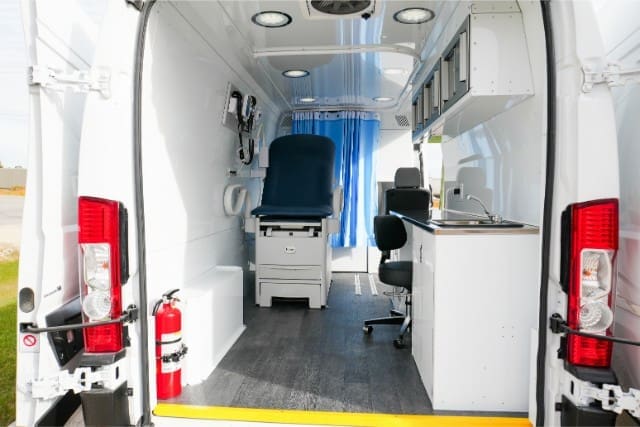
Setting up a mobile clinic in California means following specific rules under the MHCSA. Here’s a breakdown of what’s required.
General rules for mobile clinics
Same rules, adjusted for mobile use: Mobile clinics follow many of the same rules as regular clinics but with adjustments to fit the mobile setting. Instead of meeting building codes for a physical location, mobile units must meet specific mobile clinic requirements listed under the MHCSA.
Location approval matters: Wherever your mobile clinic operates, you’ll need to get approval from local authorities, including planning, zoning, and fire departments. This applies to every site the clinic will visit, so you’ll need to stay on top of these requirements for each location.
Regular check-ins to stay compliant: After you get licensed, your mobile unit will go through regular inspections to make sure everything stays up to code. This helps ensure the clinic continues to meet safety and health standards.
Policies and procedures to keep things running smoothly
Same policies as the parent clinic: Your mobile clinic must follow the same policies and procedures as the main clinic or parent facility. This includes patient care standards, how staff are trained, and how services are supervised. Keeping policies consistent ensures everything runs smoothly across all locations.
Clear patient care rules: You’ll need guidelines on things like:
- How patients are chosen for care
- How services are provided (like treatments or check-ups)
- Infection control measures to keep everyone safe
Patient transport plans: There must be detailed plans explaining how patients will be safely transported if needed, including the use of any special equipment and ways to protect patients during bad weather.
Emergency drills: Every mobile clinic needs a solid emergency and evacuation plan. The law also requires clinics to run practice drills to prepare for emergencies, with officials watching to make sure everything is done correctly.
Safety and equipment requirements for mobile clinics
Fire safety first: Your mobile unit must have the right fire safety equipment that’s approved by the local fire department. This ensures that both staff and patients are protected in case of an emergency.
Keeping equipment in top shape: All the equipment inside the mobile clinic must be regularly maintained and calibrated according to the manufacturer’s instructions. This is important to make sure everything works properly when patients need it most.
Reliable communication: The mobile clinic needs a working communication device on board so staff can stay connected with other health providers or emergency services when necessary.
Space and layout: The mobile unit must be big enough and well-organized to provide safe, effective care. Everything should be arranged so that staff can easily treat patients without delay or confusion.
Read the MHCSA for a deeper look at the physical requirements involved.
Operational and compliance with mobile clinic regulations in California
There are a couple of additional details you should know to comply with the mobile clinic regulations in California.
Do you need a lab license or CLIA waiver?
If your mobile clinic will handle lab work, like blood tests or other diagnostic tests, you’ll need a CLIA license or waiver. CLIA stands for Clinical Laboratory Improvement Amendments, and it makes sure your lab services meet quality standards.
Here’s who to contact for help regarding that:
- Laboratory Field Services (LFS)
California Department of Public Health
Address: 850 Marina Bay Parkway, Richmond, CA 94804
Email: LFScc@cdph.ca.gov
Phone: (510) 620-3800
Good to know: COVID-19 vaccinations aren’t considered lab tests, so having or not having a CLIA license won’t affect your ability to offer vaccinations. For more information about vaccines, you can contact the Immunizations Branch at covidcallcenter@cdph.ca.gov.
Extra permits you might need
Depending on what your mobile clinic offers, you might need other permits besides your mobile clinic license. Here are some key ones to know:
Pharmacy permit: If you’ll be handing out medications, check with clinicstatus@dca.ca.gov to see if you need a Board of Pharmacy (BOP) permit.
Auto insurance: Make sure your vehicle is covered with the right insurance for the road.
CARB requirements: If your clinic runs on diesel, it must meet California’s air quality standards.
Motor Carrier Permit: Your unit must pass a California Highway Patrol inspection, and if it weighs over 26,000 pounds, your driver will need a Class B license.
Local business licenses and parking rules
Every city or county may have its own rules. Here’s what to check:
Business licenses: Some areas will require a local business license to operate.
Street weight limits: Be sure your vehicle can legally drive and park on certain streets, as some have weight restrictions.
Parking rules: Look into local parking statutes and make sure you have permission to park at partner facilities if needed.
Health permits: Some places may also ask for a local health permit before you can start offering services.
We understand all of this information can be confusing.
Do you need more direction to understand some of these mobile clinic regulations? Contact the district office of the California Department of Health.
Additionally, check out some of the resources with the licensing and certification division.
Navigating mobile clinic regulations in California: Your next steps
You came to this article because figuring out mobile clinic regulations in California can feel confusing. Whether it’s getting the right mobile clinic license or understanding the Mobile Health Care Service Act, you needed answers to move forward with your mobile clinic.
Now that you’ve read this article, you have a better idea about the steps involved.
- How to add a mobile unit to your existing clinic
- Physical requirements to follow
- Extra permits and licenses you might need to stay compliant and safe
At AVAN Mobility, we’ve been helping organizations like yours for over 10 years. Our goal is simple: we remove barriers to healthcare so you can focus on what matters—bringing care to the people who need it most. Every vehicle we create is built to save lives and make healthcare more accessible. If you have any questions about mobile clinic licensing, click the button below to talk to one of our mobility experts. We’d love to help you get started.
Not ready to talk just yet? No problem! We have other resources you can check out to learn more.
Start with reading our article on the cost of a mobile clinic in LA. This will give your organization a better idea of what you can expect to pay so you can budget accordingly.
After that, read our article on securing grants for your mobile health clinic. This will give you some direction on how to get funding.
